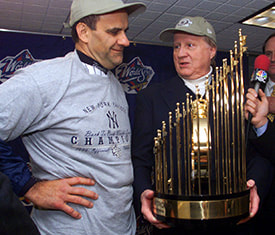Torre spent 28 seasons (4,272 games) as a player and a manager before he made his first World Series (the longest wait for anybody in the history of the game). Then he made history. In his book Ground Rules for Winners, Torre writes about two important qualities that helped him and can help you persevere and achieve your goals:
"1. Maintain Your Perspective. Don’t overreact to current troubles; remember past accomplishments that help keep your confidence high. For instance: After a bad day, remind yourself of the deals made, clients landed, steps up the ladder taken. Learn from mistakes; don't use them to beat up on yourself. Hold onto your sense of humor.
During my eight years as a player with the Braves, I was fortunate to hit behind baseball's all-time home run king, Hank Aaron. One day, Hank and I were talking about batting slumps when he made a comment that's stayed with me ever since: "Each at-bat is a new day."
No matter what our line of work, we all endure slumps. When we find ourselves in a rut, "Each at-bat is a new day" is a line worth remembering. I'd take it even further: We don't just have the opportunity to start fresh each day. We have the opportunity to start fresh each moment.
2. Stay optimistic. Drive, Competitiveness, Determination, Commitment are qualities we associate with winners. But each one of these characteristics depends on one other: optimism.Without optimism—that gut-level belief that we can succeed—we are far less likely to realize our dreams. Setbacks and slumps will stop us cold if we don't have basic faith in ourselves. No matter how badly we want to succeed, if we don't feel optimistic about our abilities and our potential, every day is going to be a struggle.
Life deals its blows to each one of us. Whether the set-backs occur in our personal or professional lives, they can ruin our dreams for success—if we let them. Optimism is the ability to accept negative events without allowing them to destroy our resolve. Slumps are inevitable, they aren't signs that we don't have what it takes to succeed. Here's my bottom line: Acknowledge that you've had a bad day, but don't live there. Move on with as much confidence as you can muster.
Don't tell yourself what you cannot do. Let your competition do that. Managers and team players alike must corner the market on positive thoughts."
How is your perspective?






 RSS Feed
RSS Feed